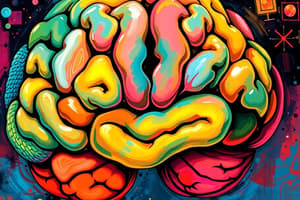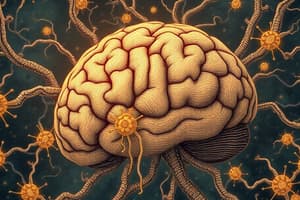Podcast
Questions and Answers
What are neuromyths?
What are neuromyths?
- The idea that individuals have distinct learning styles
- Scientific studies about how learning occurs in the brain
- Common misunderstandings about the brain that start from a grain of truth (correct)
- The ten most common misunderstandings about learning and the brain
What is the origin of the idea of enriched environments for children?
What is the origin of the idea of enriched environments for children?
- A cognitive psychology concept about multiple intelligences
- A scientific study about how learning occurs in the brain
- A misapplication of studies performed in other species, such as rats (correct)
- A belief that environments rich in stimuli improve the brains of pre-school children
What is the relationship between the concept of learning styles and multiple intelligences?
What is the relationship between the concept of learning styles and multiple intelligences?
- Learning styles are a subset of multiple intelligences
- Multiple intelligences is a type of learning style
- The idea of learning styles may have originated from the concept of multiple intelligences (correct)
- The two concepts are unrelated
What is the impact of overly decorated classrooms on learning?
What is the impact of overly decorated classrooms on learning?
What is the most common misunderstanding about the brain and pre-school children?
What is the most common misunderstanding about the brain and pre-school children?
What is the main reason for misunderstandings about learning and the brain?
What is the main reason for misunderstandings about learning and the brain?
What did two students in Yana's lab do?
What did two students in Yana's lab do?
Flashcards
Neuromyths
Neuromyths
Common misunderstandings about the brain based on partial truths.
Enriched environments origin
Enriched environments origin
Misapplied research from studies on other species like rats.
Learning styles
Learning styles
Roots in the concept of multiple intelligences, suggesting individual learning preferences.
Impact of classroom decor
Impact of classroom decor
Signup and view all the flashcards
Common misunderstanding in preschoolers
Common misunderstanding in preschoolers
Signup and view all the flashcards
Misunderstandings about learning
Misunderstandings about learning
Signup and view all the flashcards
Yana's lab findings
Yana's lab findings
Signup and view all the flashcards
Study Notes
Common Misunderstandings About Learning and the Brain
- A small group of scientists study in detail how learning occurs in the brain, while the general population knows that children need to be taught.
- Teachers are enthusiastic about what cognitive psychology and neuroscience have to offer to education.
- Misunderstandings about learning and the brain often arise when information is taken out of context and condensed into simplified overgeneralizations.
- Neuromyths are common misunderstandings about the brain that start from a grain of truth.
- Two students in Yana’s lab identified ten most common misunderstandings about learning and the brain from 12 empirical papers.
- The belief that environments rich in stimuli improve the brains of pre-school children is a common misunderstanding.
- The idea of enriched environments for children may have come from a misapplication of studies performed in other species, such as rats.
- Overly decorated classrooms can lead to a decrease in learning relative to more sparsely decorated classrooms, due to potential for distraction.
- The belief that individuals have distinct learning styles is a common misunderstanding.
- The idea of learning styles may have originated from the concept of multiple intelligences, which suggests that individuals have different strengths in various areas.
- The belief that we only use 10% of our brain is a common misunderstanding.
- The belief that short bouts of co-ordination exercises can improve integration of the left and right hemispheres of the brain is a common misunderstanding.
Studying That Suits You
Use AI to generate personalized quizzes and flashcards to suit your learning preferences.




